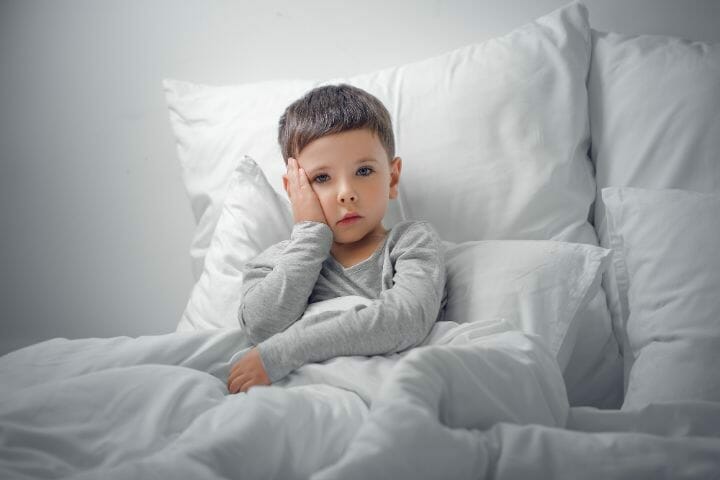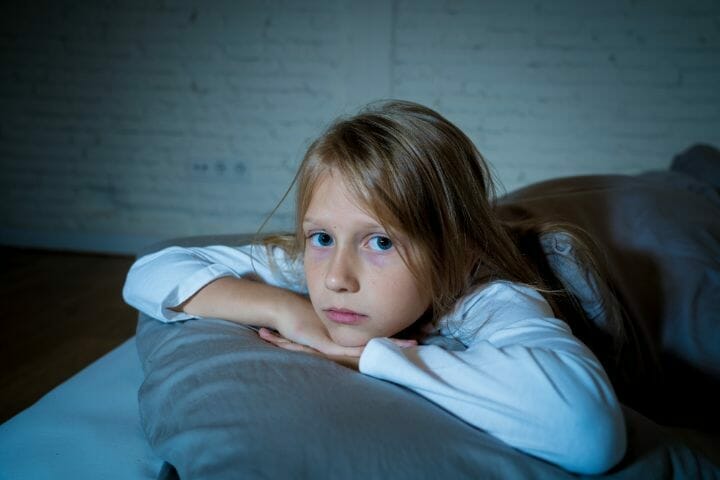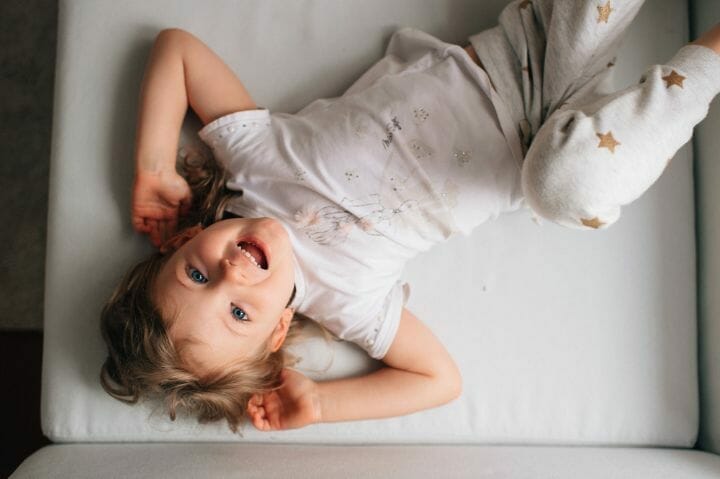Depending on where they are on the spectrum, autistic children may have limited communication and social interactions, unpredictable behavior patterns, sleeping disorders, short attention span, depression, epileptic fits, feeding issues, extreme sensitivity to certain stimuli, and other concurrent issues. An autistic or special-needs child can be at any point in this spectrum, showcasing mild to severe symptoms.
Sleep distress among autistic children is one of the most common and troublesome conditions that parents have to deal with. Many autistic kids find it difficult to fall asleep easily. And if they do fall asleep, it is common for the sleep to be disturbed with several periods of wakefulness.
Bed-wetting, sleep-talking, and other sleep problems can make it even more distressing for parents of a child on autistic spectrum disorder.
However, this sleep disturbance of autistic children can be overcome with some knowledge and certain small remedies that can help to ease things.
The following article will not only tell you about all the sleeping troubles an autistic child may face but most importantly, the measures that can be taken so that both the child and parents can get a good, long, refreshing night’s sleep.
Contents
Sleep Issues in Autism
Studies estimate that 40-80% of autistic children have sleeping disorders. A child with autism has a hard time falling asleep and remains restless and irritable throughout the night. The sleeping problems encountered are:
- Taking time to fall asleep and showing resistance to it
- Sleeping for shorter periods, than the average for their age
- Frequent awakening and staying awake for long periods and making noises at night
- Irregular waking up and sleeping patterns
- Bedwetting
- Sleep-disordered breathing or sleep apnea, a condition that creates short momentary stopping and starting of breathing while sleeping
- Rapid eye movements (REM) sleep behavior disorders with unpleasant, jerky movements of hands and legs, accompanied with loud, sudden vocal sounds.
Why Do Autistic Children Have Sleeping Problems?
Studies have shown several reasons responsible for disturbed sleeping patterns in autistic children which include hormonal, genetic, environmental, and immunological factors.
Melatonin is a hormone that maintains the day and night rhythm of the body. Decreased production of this hormone in children on the autism spectrum, causes sleep disturbance. A chemical known as GABA which transmits nervous signals in the sleep-inducing area of the brain is also affected in autism spectrum disorder.
Another reason is the possible deficiency of Vitamin D which is essential for several metabolic and nervous regulatory functions.
You may also like Best Book for Parents of Autistic Child
Why is Sleep Important for Autistic Children?
Body growth and sleep are tightly correlated among infants and children. Lack of proper sleep can lead to developmental delay and other issues. Decreased sleep in autistic children may cause many related consequent effects such as:
- Decreased appetite and feeding issues thus mental and physical developmental delay
- Increased irritable behavior
- Increased hyperactivity during the day
- Difficulty in regulating emotions
- Decreased social interactive behavior
- Breathing and other upper respiratory tract and vision problems, that also show an association with disturbed sleep
- And finally, increased stress in parents and caregivers
How to Assess Disturbed Sleeping Patterns in Autistic Children?
It is important to know how much the pattern of sleep of the child is disturbed to rectify it. This can be determined in two ways:
Subjective ways
These are based on the observations of the parents or caregiver. Either a sleep diary can be maintained which records all sleeping and waking hours of the child along with predisposing factors that may be causing sleep distress. It is important to note down any and every sleep disturbance to get a good idea of the sleeping pattern.
Also, parents are made to answer pre-determined questions about the sleeping habits of the child.
Objective ways
A method called Actigraphy is used in which the child is made to wear an actigraph device on the wrist which records all sleep parameters. These parameters are then analyzed by specialized computer software. A method called PSG (polysomnography) is also used in which various nervous and breathing factors are recorded by a polysomnogram over 6-8 hours and analyzed electronically to point out sleep difficulties.
You may also like Best Headphones for Autistic Children
Ways to Help Autistic Kids Sleep Better
All this brings us to the question of what can be done to help autistic kids sleep better. Some small and big steps can be taken to help autistic children have longer sleeping hours and less interrupted sleeping. Some of the strategies that can be adopted for positive sleep reinforcement are as follows:
Fixed Bedtime Routine
A good bedtime routine helps the child to calm down before sleep. Pick a suitable time and ease the child to bed. Try to stick to the same time every day. Reminders can be used so that it gives a fixed routine to the parents as well.
Charts can be made for the child, written or with pictures which can set a fixed routine for the child before sleep, such as bathing, brushing, etc. All this will help the child to relax and prep him up to go to bed. In case a child is not going off to sleep at a particular time for some days, change the time and stick to it over the next couple of days.
Adjusting Environmental Conditions
The variables of the room can be adjusted where the child has to go to sleep. Adjust the temperature of the room to a suitable degree. Avoid strong lights and other visual stimuli which may disturb or distract the child.
A night light can be put in the room which the child likes with dim light settings. Certain colors and textures may not be pleasant and can be adjusted to what the child prefers. Cut out any loud or sudden noises in the room.
Bedding
Specialized beds for autistic children can help the child’s sleep.
The color of the bedding where the child will sleep can be picked to the child’s liking. A soft blanket of the child’s choice can be given for cuddling in. Use sheets of soft material such as cotton. Avoid synthetic polyester sheets.
The pillow should be soft and comfortable too. Use pillows of medium height that are not too high or too low for the child.
Moreover, weighted blankets can be used. These are blankets with distributed weights that make use of the concept of deep pressure application to give the feeling of a ‘hug’ to the person. They can be around 10-20 % of the person’s weight. They can be used to calm down an anxious autistic child while sleeping.
Probiotics
Research suggests that good gut health and probiotics help sleep quality. Probiotics for autistic children can help them have a stronger digestive system and enjoy better sleep. But please be mindful of speaking with your doctor before giving your child a probiotic.
Clothes of the Child
Kids usually have their favorites when it comes to clothing. Pick night suits of colors and patterns which the child likes, preferably light colors. Avoid synthetic fabrics and use organic fabrics such as cotton. Pick comfortable loose pajamas.
Another option to help children sleep is a weighted vest for kids. Weighted vests are useful in the case of autism. They work on the same principle of deep pressure sensation as weighted blankets.
Cut Down on Screen Time
Screen exposure just before sleeping will act opposite to calm down the child. Their mind will stay awake, active, and occupied and it will be harder to soothe them down. Also, the increased light will interfere with the production of melatonin, the hormone needed to regulate their circadian rhythm (day-night cycle).
Avoid High Energy Activities
Do not play any physical games or do any high-energy activities with the kids just before sleeping. Active sports for autistic children are helpful during the day. They tire the child out and give her an outlet to expend excess energy. Before sleeping the kids can be made to do quieter and calm-inducing activities like reading a book, cuddling, or coloring.
Poems can also be read out to autistic children especially the ones with a soothing sing-song tune. Chalk out activities that are preferred by the child which are calming as well.
Give a Bath
Many autistic kids enjoy a bath before sleep. It can make them drowsy as well. This may not be liked by some kids. For such kids, they can be given a bath earlier in the evening.
Play Music
Music is a universal language. Many studies support the fact that soothing music can calm one down. Low volume calming music, preferably classic and instrumental can be played for the child.
Aromatherapy
Some soothing essential oils such as lavender and chamomile can be diffused into the child’s room to help reduce anxiety and calm down the child.
Massage
A body and head massage can help relax stressed muscles in the body. The mind can naturally feel relaxed when the body relaxes and falls asleep sooner.
Weighted Toys
Like weighted blankets and weighted vests, weighted sensory toys for autistic children work on the principle of deep pressure and help children relax. Playing or snuggling with a weighted toy can help children fall to sleep quicker.
White Noise Sleep
White noise is a constant calming sound that can block out all other sounds. Here sound waves of a broad spectrum are fused to produce a constant humming sound.
This sound gives the mind something to focus on and not wander around thinking of random things or stay alert. While many fall asleep easily to white noise, many may prefer silence. Adopt what works better for that particular child.
Sleep Training
This involves training the child to fall asleep on his own. After the bedtime routine is over, lay the kid in bed, say the kid ‘goodnight’, and leave the room. The parent can come back to the room again after some time to check on the child.
If still awake or irritated, touch or pat the child lovingly. You can also give a ‘high five, or a ‘thumbs-up’ to the child. You can say to the child, ‘you are ok, it’s bedtime, sleep!’.
Stay for a minute or so in the room and leave, only to return later after some time again to check on the child. The child’s behavior may get rowdier for a few days before it starts getting better, once the child gets accustomed to the routine.
Pharmacotherapy
This means therapy with medicines. If the child does not show any response to the above behavioral and environmental changes, then medicines can also be an option to calm the child and help fall asleep.
However, they must be taken only after physician consultation. These medicines are essentially anti-depressants, sedatives, and anti-epileptic drugs. They have to be used with extreme caution in an autistic child and only after a doctor’s recommendation.
Melatonin
Since studies have related melatonin with circadian rhythm control, this hormone can reduce the time a child takes to fall asleep. However, there is no concrete study to associate it with reduced awakening at night and control of other sleep disturbances.
Administering medicines to an autistic child is usually tough and it often has to be disguised with foods or liquids so that the child may consume them. Melatonin is also available in toothpaste form for autistic children.
But again, it should be given only after recommendations from a physician. It must be noted that since it is a hormone replacement, it is different from sleep-inducing drugs and doesn’t cause addiction as such.
Help From Technology
Technology is now coming to the front with solutions for the problem of sleep distress in autistic children. Following is a list of a few aids that can potentially help autistic children sleep better.
- Music Pillow
This is a specially designed sleeping aid that plays music through the pillow along with gentle vibrations to help the nervous system to relax and fall asleep. The music is played through the product’s app that is available freely on app stores. Only the user can hear the music playing through it and it is effective for children of all ages dealing with autistic spectrum disorder or children who have anxiety and trouble falling asleep.
Also read What Will Happen to an Autistic Adult When Parents Die
Conclusion – Helping Autistic Children Sleep
Sleeping disorders harm cognitive behavior (the process of acquiring knowledge), learning, memory, mood, and also the growth of an autistic child. Efforts should be made to manage the child by no or very little medicinal means.
The approach should be largely a customized sleep routine with a good sleep-wise approach to calm the child and improve the quality of life and ultimately reduce stress in not just the child but also the parents.







